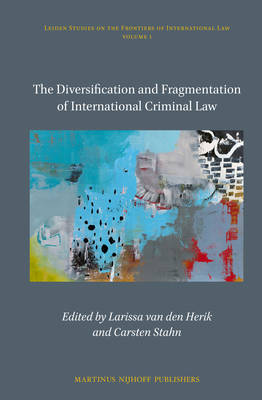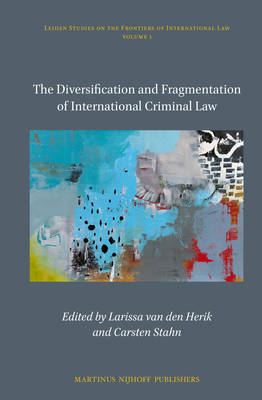
- Afhalen na 1 uur in een winkel met voorraad
- Gratis thuislevering in België vanaf € 30
- Ruim aanbod met 7 miljoen producten
- Afhalen na 1 uur in een winkel met voorraad
- Gratis thuislevering in België vanaf € 30
- Ruim aanbod met 7 miljoen producten
The Diversification and Fragmentation of International Criminal Law
€ 419,95
+ 839 punten
Omschrijving
This volume is the first in a new series of Studies on the Frontiers of International Law. The term 'frontier' is traditionally associated with proximity to a boundary or a demarcation line. But it is also a connecting point, i.e., a passage or channel between spaces that are usually considered as separate entities. The Series aims to explore the visible and imaginary boundaries of scholarship in International Law. It is designed to test the existing table of contents, vocabulary and limits of 'Public International Law', to investigate lines and linkages between 'centre' and 'periphery', and to re-map or re-think some of its conceptual boundaries.
The current volume is written in this spirit. It deals with the tension between unity and diversification which has gained a central place in the debate under the label of 'fragmentation'. It explores the meaning, articulation and risks of this phenomenon in a specific area: International Criminal Justice. It brings together established and fresh voices who analyse different sites and contestations of this concept, as well as its context and specific manifestations in the interpretation and application of International Criminal Law. The volume thereby connects discourse on 'fragmentation' with broader inquiry on the merits and discontents of legal pluralism in 'Public International Law'.
The current volume is written in this spirit. It deals with the tension between unity and diversification which has gained a central place in the debate under the label of 'fragmentation'. It explores the meaning, articulation and risks of this phenomenon in a specific area: International Criminal Justice. It brings together established and fresh voices who analyse different sites and contestations of this concept, as well as its context and specific manifestations in the interpretation and application of International Criminal Law. The volume thereby connects discourse on 'fragmentation' with broader inquiry on the merits and discontents of legal pluralism in 'Public International Law'.
Specificaties
Betrokkenen
- Uitgeverij:
Inhoud
- Aantal bladzijden:
- 734
- Taal:
- Engels
- Reeks:
- Reeksnummer:
- nr. 1
Eigenschappen
- Productcode (EAN):
- 9789004214590
- Verschijningsdatum:
- 23/10/2012
- Uitvoering:
- Hardcover
- Formaat:
- Genaaid
- Afmetingen:
- 165 mm x 241 mm
- Gewicht:
- 1224 g

Alleen bij Standaard Boekhandel
+ 839 punten op je klantenkaart van Standaard Boekhandel
Beoordelingen
We publiceren alleen reviews die voldoen aan de voorwaarden voor reviews. Bekijk onze voorwaarden voor reviews.









